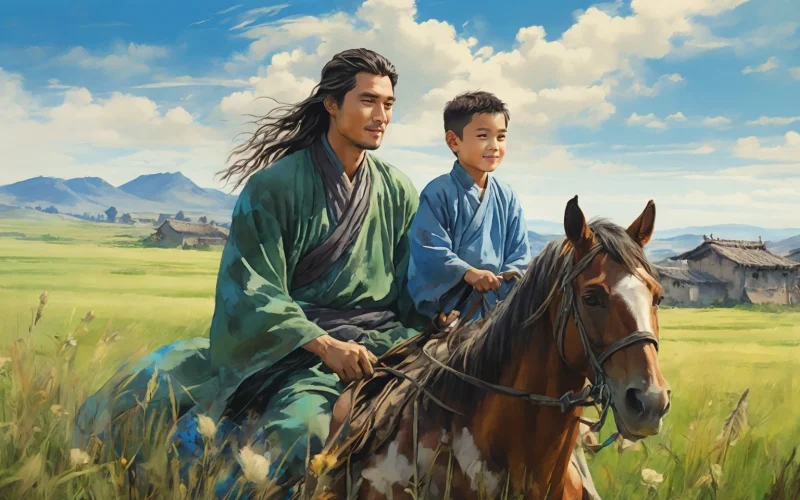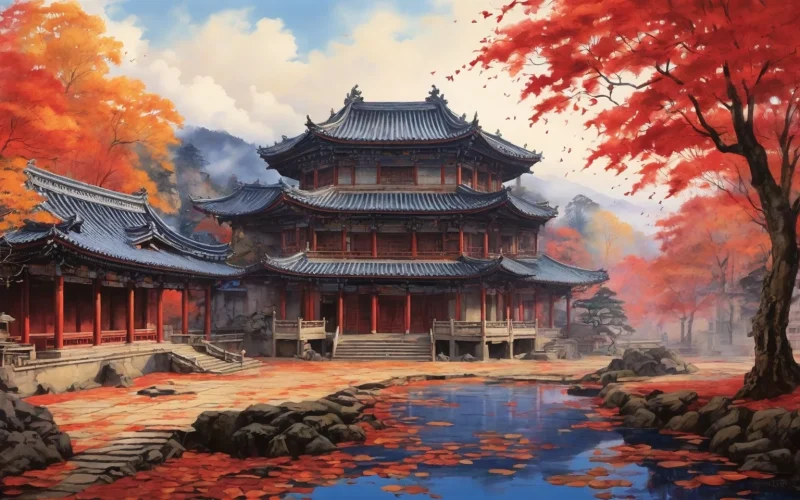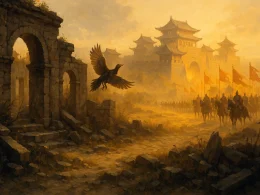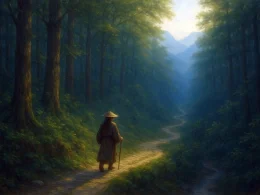My darling son, my pride and joy,
A cut above all other boys.
One year from Heaven, he could tell
The numbers six and seven well.
At four, he knew his name with grace;
He never grabbed for pears in haste.
Friends came and said, to my delight,
“This child is made of different light.”
His fine looks left no wish unmet,
Like a young phoenix from the nest.
An immortal, if he came,
Would call him by that sacred name.
All that my kindly friends had said
Would cheer an old man, comforted.
In spring, by daylight or at night,
He played with cousins, full of might.
They ran from hall to hall in throngs,
A noisy, happy burst of songs.
When guests arrived to visit me,
He rushed to greet them eagerly.
If asked what gift he would request,
He’d hide the truth within his breast.
He’d mimic one guest’s funny face
In hurried, unrefined disgrace;
Another, bearded, stuttering speech
He copied, well within his reach.
Like a young eagle in first flight,
A warhorse charging in a fight,
He rode his bamboo horse with cheer,
And made it charge without a fear.
He teased officials, blamed their men,
Then turned to mock them all again.
By lamplight, he would make his vow,
And kneel to pray to Buddha now.
He swept down webs with his toy whip,
And sipped at honey, sweet and ripe.
As light as butterflies in spring,
He vied with willow-down on wing.
Meeting his sister, sweet and dear,
He’d play at games without a fear.
He took her dainty toilet-case,
Broke its gold lock in hurried chase.
He’d lie flat on the ground and stay;
When threatened, he’d not obey.
He tugged the window-screen askew,
Spat on the lute and wiped it new.
Sometimes he’d watch me as I write,
Stands still and straight, a solemn sight.
He’d wrap my books in brocade fine,
As if those volumes were divine.
Begged me to write the word “spring” clear,
Then sang of springtime, sweet and dear.
On plantain leaf, so smooth and white,
His budding brush would trace with light.
I, in my youth, loved books no end,
In my small nook, I would attend.
At forty, gaunt and somewhat wise,
I feared no bug, nor insect’s cries.
But do not seek an empty name
As I have done, to my own shame.
Learn from the sages, ages past,
Let your foundation firm be cast!
Then you may master kings and lords,
Unbothered by their trifling words.
The foes now in the northwest land
Are restless, hard to understand.
No war or peace can cure this blight;
A festering disease, this plight.
Grow up, be a man among men,
Kill the foe in his foul den!
My son, be a hero, brave and true,
Not a pale scholar, worn and blue.
Original Poem
「骄儿诗」
李商隐
衮师我骄儿,美秀乃无匹。
文葆未周晬,固已知六七。
四岁知姓名,眼不视梨栗。
交朋颇窥观,谓是丹穴物。
前朝尚器貌,流品方第一。
不然神仙姿,不尔燕鹤骨。
安得此相谓?欲慰衰朽质。
青春妍和月,朋戏浑甥侄。
绕堂复穿林,沸若金鼎溢。
门有长者来,造次请先出。
客前问所须,含意不吐实。
归来学客面,闱败秉爷笏。
或谑张飞胡,或笑邓艾吃。
豪鹰毛崱屴,猛马气佶傈。
截得青篔筜,骑走恣唐突。
忽复学参军,按声唤苍鹘。
又复纱灯旁,稽首礼夜佛。
仰鞭罥蛛网,俯首饮花蜜。
欲争蛱蝶轻,未谢柳絮疾。
阶前逢阿姊,六甲颇输失。
凝走弄香奁,拔脱金屈戍。
抱持多反侧,威怒不可律。
曲躬牵窗网,衉唾拭琴漆。
有时看临书,挺立不动膝。
古锦请裁衣,玉轴亦欲乞。
请爷书春胜,春胜宜春日。
芭蕉斜卷笺,辛夷低过笔。
爷昔好读书,恳苦自著述。
憔悴欲四十,无肉畏蚤虱。
儿慎勿学爷,读书求甲乙。
穰苴司马法,张良黄石术。
便为帝王师,不假更纤悉。
况今西与北,羌戎正狂悖。
诛赦两未成,将养如痼疾。
儿当速长大,探雏入虎窟。
当为万户侯,勿守一经帙!
Interpretation
This poem was composed in the spring of the third year of the Dazhong era (849 CE) under Emperor Xuanzong of Tang, when Li Shangyin was thirty-eight years old, serving as the County Sheriff of Zhouzhi. By this time, the poet had already experienced the calamities of the Niu-Li factional strife, shuffled between various military and governors' offices, and found his official career arduous and stalled. His son, Gūnshī, was about five years old – bright and lively – which triggered complex emotions in the poet: paternal joy and pride, mixed with lament for his own precarious and thwarted circumstances ("haggard, approaching forty, fleshless, I fear fleas and lice"), and further tinged with anxiety over the turbulent political and military situation (rebellions of the Qiang and Rong tribes in the northwest). This poem clearly borrows its form from Zuo Si's "Poem of a Beloved Daughter," but it breaks through the pattern of merely describing childish charm, instead intertwining personal fate, family education, and the responsibilities of the era. It stands as a rare work in Li Shangyin's oeuvre for its direct emotional expression and rich layering of feeling.
Stanza 1
衮师我骄儿,美秀乃无匹。
Gǔnshī wǒ jiāo ér, měi xiù nǎi wú pǐ.
文葆未周晬,固已知六七。
Wén bǎo wèi zhōu zuì, gù yǐ zhī liù qī.
四岁知姓名,眼不视梨栗。
Sì suì zhī xìngmíng, yǎn bù shì lí lì.
交朋颇窥观,谓是丹穴物。
Jiāo péng pō kuī guān, wèi shì dān xué wù.
前朝尚器貌,流品方第一。
Qián cháo shàng qì mào, liú pǐn fāng dì yī.
不然神仙姿,不尔燕鹤骨。
Bù rán shénxiān zī, bù ěr yàn hè gǔ.
安得此相谓?欲慰衰朽质。
Ān dé cǐ xiāng wèi? Yù wèi shuāi xiǔ zhì.
Gūnshī, my cherished son, / Your beauty and brilliance have no peer. / In swaddling clothes, before your first birthday, / You surely knew six and seven. / At four, you knew your name, / Your eyes didn't covet pears or chestnuts. / Friends who observe you closely / Say you're a creature from Danxue (the phoenix's abode). / Had we lived in an age that prized talent and looks, / Your ranking would be of the first class. / If not an immortal's graceful bearing, / Then surely the bones of swallow or crane. / How dare I accept such words? / They're meant to console this decaying frame.
The opening sketches the son's exceptional gifts with brushstrokes full of affection. "Your beauty and brilliance have no peer" summarizes his outstanding nature, while details like "knew six and seven" and "knew your name" provide concrete proof of his precocity. "Your eyes didn't covet pears or chestnuts" alludes inversely to Tao Qian's "Poem Blaming My Sons" ("Yong and Duan at thirteen, / Don't know six from seven; / Tong at nearly nine, / Seeks only pears and chestnuts"), implying a contrast and a source of pride. The metaphor "a creature from Danxue" (a phoenix) places him in a transcendent realm. Then the brush suddenly turns: the hypothetical "Had we lived in an age that prized talent and looks" and the self-questioning "How dare I accept such words?" mix self-mockery and bitterness into the praise—these compliments are perhaps mere consolation for his "decaying frame," faintly revealing the poet's dissatisfaction with his actual circumstances.
Stanza 2
青春妍和月,朋戏浑甥侄。
Qīngchūn yán hé yuè, péng xì hún shēng zhí.
绕堂复穿林,沸若金鼎溢。
Rào táng fù chuān lín, fèi ruò jīn dǐng yì.
门有长者来,造次请先出。
Mén yǒu zhǎngzhě lái, cǎocì qǐng xiān chū.
客前问所须,含意不吐实。
Kè qián wèn suǒ xū, hán yì bù tǔ shí.
归来学客面,闱败秉爷笏。
Guīlái xué kè miàn, wéi bài bǐng yé hù.
或谑张飞胡,或笑邓艾吃。
Huò xuè Zhāng Fēi hú, huò xiào Dèng Ài chī.
豪鹰毛崱屴,猛马气佶傈。
Háo yīng máo zè lì, měng mǎ qì jí lì.
截得青篔筜,骑走恣唐突。
Jié dé qīng yún dāng, qí zǒu zì tángtū.
忽复学参军,按声唤苍鹘。
Hū fù xué cānjūn, àn shēng huàn cāng gǔ.
又复纱灯旁,稽首礼夜佛。
Yòu fù shā dēng páng, qǐshǒu lǐ yè fó.
仰鞭罥蛛网,俯首饮花蜜。
Yǎng biān juàn zhū wǎng, fǔ shǒu yǐn huā mì.
欲争蛱蝶轻,未谢柳絮疾。
Yù zhēng jiádié qīng, wèi xiè liǔxù jí.
阶前逢阿姊,六甲颇输失。
Jiē qián féng ā zǐ, liùjiǎ pō shū shī.
凝走弄香奁,拔脱金屈戍。
Níng zǒu nòng xiāng lián, bá tuō jīn qū shù.
抱持多反侧,威怒不可律。
Bào chí duō fǎncè, wēi nù bùkě lǜ.
曲躬牵窗网,衉唾拭琴漆。
Qū gōng qiān chuāng wǎng, kài tuò shì qín qī.
有时看临书,挺立不动膝。
Yǒu shí kàn lín shū, tǐng lì bù dòng xī.
古锦请裁衣,玉轴亦欲乞。
Gǔ jǐn qǐng cái yī, yù zhóu yì yù qǐ.
请爷书春胜,春胜宜春日。
Qǐng yé shū chūn shèng, chūn shèng yí chūn rì.
芭蕉斜卷笺,辛夷低过笔。
Bājiāo xié juǎn jiān, xīnyí dī guò bǐ.
In spring's fair and gentle month, / With friends and cousins he plays, all one band. / Around the hall, then through the woods they race, / Boiling over like a bubbling golden tripod's flood. / If an elder comes calling at the gate, / He hastily asks to go out first. / Before the guest, asked what he needs, / Meaning is held within, the truth not told. / Returns to mimic the guest's face, / Breaks through the door, holding his father's tablet of office. / Sometimes teases like Zhang Fei, bearded and coarse, / Sometimes laughs at Deng Ai for his stammering speech. / A bold eagle, feathers standing on end; / A fierce steed, breath coming in snorts. / Cuts a green bamboo, rides it off wildly, / Galloping, charging, reckless and bold. / Suddenly imitates the "Canjun" role, / Lowering his voice to call the "Canggu." / Then again by the gauze lantern's side, / Kowtows, paying respects to the Buddha at night. / Lifts his whip to entangle spiderwebs, / Bows his head to sip nectar from flowers. / Wishes to rival the butterfly's lightness, / Would not yield to the willow catkin's speed. / On the steps he meets his elder sister, / At the game of Liujia he often loses. / Stubbornly runs to play with her scented case, / Pries off its golden hinges. / When held, he squirms and wriggles much, / Stern scolds and anger cannot discipline him. / Bends his body to tug the window screen, / Spits to polish the lacquer of the lute. / Sometimes watches me practicing calligraphy, / Stands bolt upright, knees not bending. / Brings ancient brocade, asks to make clothes, / Seeing a jade scroll-roller, also wants to beg it. / Asks his father to write springtime blessings, / Spring blessings suit the spring day well. / A banana leaf, slanted, serves as paper; / A magnolia bud, dipping low, brushes past the brush.
This section uses a continuous sequence of dynamic scenes to exhaustively display a child's lively nature. The poet is like a hand holding a rapidly switching lens, capturing over a dozen vivid snapshots: from the boisterous noise of group play ("Boiling over like a bubbling golden tripod's flood") to the childish cleverness of receiving guests ("Meaning is held within, the truth not told"); from imitating historical figures (Zhang Fei, Deng Ai) and theatrical roles ("Canjun," "Canggu" – roles in Tang dynasty comic plays) to imitating animals (eagle, horse) and natural phenomena (butterfly, catkin); from mischievous troublemaking (playing with the dressing case, polishing the lute with spit) to moments of accidental solemnity (watching calligraphy practice, paying respects to Buddha). These images are each interesting in their own right, yet together they outline the figure of a child full of energy, curiosity, imagination, and mimicry. Lines like "A banana leaf, slanted, serves as paper; / A magnolia bud, dipping low, brushes past the brush" further infuse poetic beauty into the child's antics.
Stanza 3
爷昔好读书,恳苦自著述。
Yé xī hào dúshū, kěn kǔ zì zhùshù.
憔悴欲四十,无肉畏蚤虱。
Qiáocuì yù sìshí, wú ròu wèi zǎo shī.
儿慎勿学爷,读书求甲乙。
Ér shèn wù xué yé, dúshū qiú jiǎ yǐ.
穰苴司马法,张良黄石术。
Rángjū sīmǎ fǎ, Zhāng Liáng Huángshí shù.
便为帝王师,不假更纤悉。
Biàn wéi dìwáng shī, bù jiǎ gèng xiān xī.
况今西与北,羌戎正狂悖。
Kuàng jīn xī yǔ běi, Qiāng Róng zhèng kuángbèi.
诛赦两未成,将养如痼疾。
Zhū shè liǎng wèi chéng, jiāng yǎng rú gùjí.
儿当速长大,探雏入虎窟。
Ér dāng sù zhǎngdà, tàn chú rù hǔ kū.
当为万户侯,勿守一经帙!
Dāng wéi wàn hù hóu, wù shǒu yī jīng zhì!
Your father in the past loved to study, / Diligent and earnest, wrote his own works. / Haggard, approaching forty now, / Fleshless, I fear fleas and lice. / My son, take care, don't learn from your father, / Studying books, seeking the top grades. / Study Rangju's Marshal's Art of War, / Zhang Liang's strategies from the Yellow Stone. / Then become a teacher to emperors and kings, / No need for trivial, detailed knowledge. / Moreover, now in the west and north, / The Qiang and Rong run wild and rebel. / Punishment and pardon both have failed, / Nurturing them is like a chronic disease. / My son, you ought to grow up fast, / Seek the fledglings in the tiger's den! / You must become a Marquis of Ten Thousand Households, / Don't just guard a single classic's scroll!
The final stanza sees a sudden deepening of emotion, shifting from doting affection to a pained summary of life and a charge for the times. The poet uses himself as a mirror: the stark contrast between "Diligent and earnest, wrote his own works" and "Haggard, approaching forty now" is a profound reflection on the Tang imperial examination system and the fate of literati. The exaggerated self-mockery of "Fleshless, I fear fleas and lice" captures the窘迫 of the impoverished scholar. Therefore, his expectations for his son undergo a fundamental reversal—"My son, take care, don't learn from your father, / Studying books, seeking the top grades." The direction he points to is: study Rangju's military strategies, Zhang Liang's tactics ("strategies from the Yellow Stone"), and become a "teacher to emperors and kings." Finally, placing family hopes within the context of the era's crisis ("The Qiang and Rong run wild and rebel"), he issues the cry, "You must become a Marquis of Ten Thousand Households, / Don't just guard a single classic's scroll!" This is both the升华 of paternal love and the inevitable choice of a literatus concerned for his country, intertwining personal fate with familial and national responsibility.
Holistic Appreciation
The unique value of this poem lies in its successful construction of three interwoven dimensions: the vivid, concrete world of the child; the anguished, self-reflective figure of the father; and the crisis-ridden backdrop of the era. Compared to Zuo Si's "Poem of a Beloved Daughter," Li Shangyin injects a stronger sense of personal grief and historical consciousness; compared to Du Fu's deep affection in lines like "From afar, I pity my little children," he adds a measure of rational thought about educational paths. The poem's structure seems loose but is actually tight: the first two stanzas exhaustively elaborate on the son's "cherished" qualities (intelligence, liveliness), precisely to contrast with and give weight and urgency to the father's "admonition" in the third stanza. The reversal from "Your father in the past loved to study" to "don't learn from your father" is not only a critique of the examination system but also a profound reflection on the path to value realization for scholars—in times of crisis, should one remain a "haggard" literatus, or become a practitioner who "Seeks the fledglings in the tiger's den"?
Artistic Merits
- Poetic Refinement of Everyday Details: From a wealth of mundane moments, the poet selects the most evocative snapshots (e.g., "Lifts his whip to entangle spiderwebs," "Bows his head to sip nectar"). These details preserve the genuine essence of childhood innocence while simultaneously elevating it with a distinct lyrical vitality.
- Masterful Control of Emotional Rhythm: The poem's emotional tone shifts seamlessly—from the proud delight of the opening, through the abundant charm and playful energy of the central description, to the somber urgency of the final exhortation. This progression feels organic, like natural breath, culminating powerfully in the passionate plea of the conclusion: "Don't just guard a single classic's scroll!"
- Contrastive Use of Allusion: The poem employs allusions with dual purposes. When depicting the son's playful antics, references to figures like the bold general Zhang Fei or the stammering strategist Deng Ai humorously highlight the child's lively mimicry. In contrast, when turning to paternal advice, allusions to renowned strategists like Rangju and Zhang Liang serve as aspirational models, establishing a deliberate contrast between lighthearted and serious registers.
- Courage in Self-Critique: The pivotal injunction, "don't learn from your father," represents a profound and courageous act of self-deconstruction. It embodies the poet's critical reflection on his own life path—a stark and brave stance in an era that unwaveringly upheld the maxim, "All occupations are base; only book-learning is exalted."
Insights
This work shows us a kind of paternal wisdom that transcends the limitations of its era. Li Shangyin's expectations for his son are not simply about following in his father's footsteps or bringing glory to the family, but a rational choice based on a clear-eyed reflection on his own fate ("haggard, approaching forty") and a keen judgment of the needs of the times ("The Qiang and Rong run wild and rebel"). He breaks the single life-script of "study—imperial exams—official career," advocating for planning one's life according to the demands of the era (military talent) and the individual's characteristics (the son's lively courage). This enlightens contemporary education: true love is not forcing one's own unrealized dreams onto one's children, nor is it blindly following mainstream social paths. It is, rather, based on a deep understanding of both the era and the self, helping children find a unique path that can both realize personal value and answer the call of the times. The poem's cry of "Don't just guard a single classic's scroll!" still rings out powerfully today, in an era that encourages interdisciplinary thinking and values innovation.
Poem translator
Xu Yuanchong (许渊冲)
About the poet
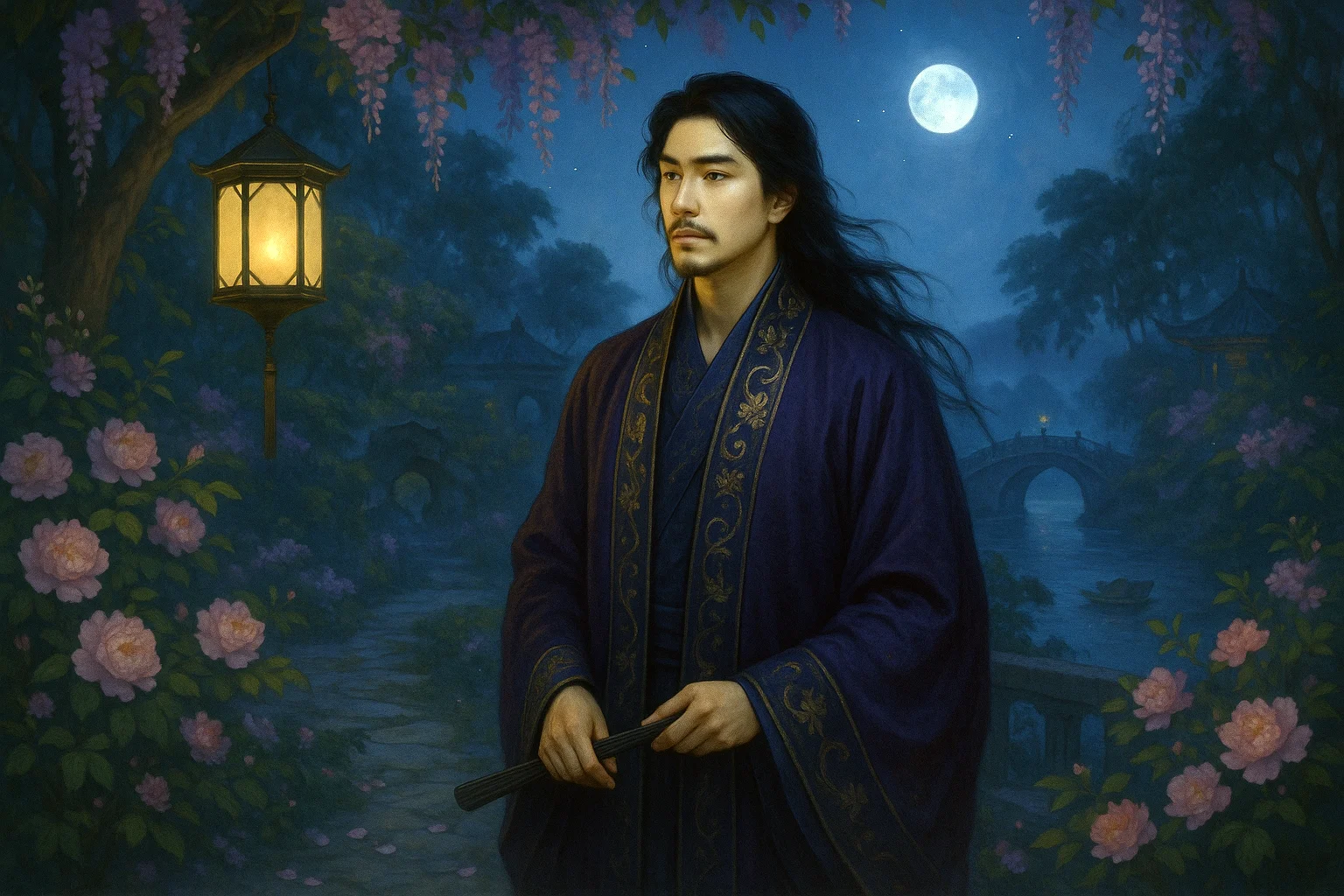
Li Shangyin (李商隐), 813 - 858 AD, was a great poet of the late Tang Dynasty. His poems were on a par with those of Du Mu, and he was known as "Little Li Du". Li Shangyin was a native of Qinyang, Jiaozuo City, Henan Province. When he was a teenager, he lost his father at the age of nine, and was called "Zheshui East and West, half a century of wandering".






